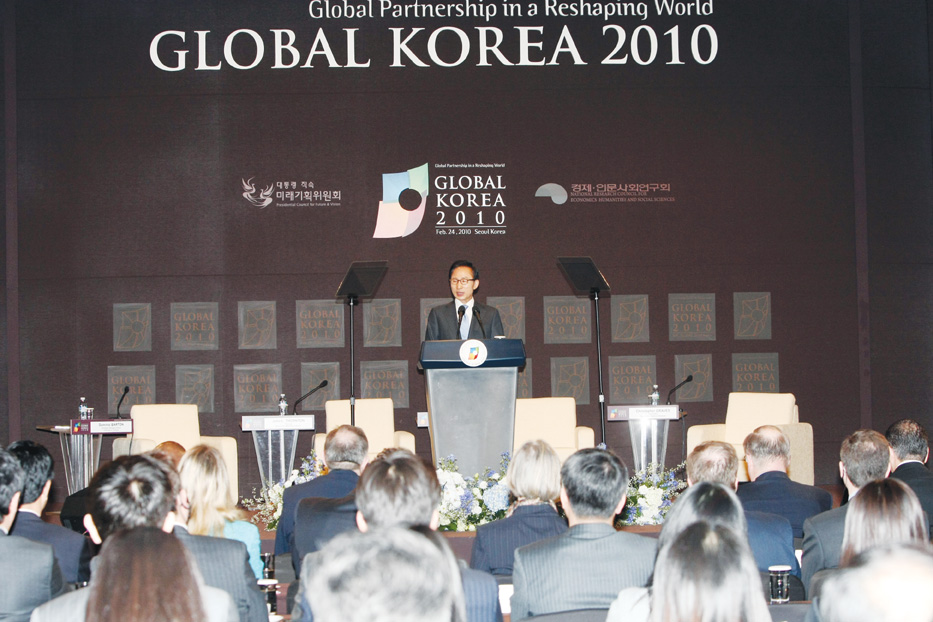Bridge Between Advanced and Emerging Countries
Korea called on to play central role in supporting emerging countries with its development experience

"Global Korea 2010," an international forum on 'global partnerships in a reshaping world' held its meeting on Feb. 24 in the Dynasty Hall of Hotel Shilla hosted by the Presidential Council for Future and Vision and the National Research Council for Economics, Humanities and Social Sciences.
The global event's organizers included the Korea Institute for International Economic Policy, the Korea Development Institute and the Korea Institute of Finance, and its sponsors were the Prime Minister's Office, the Ministry of Strategy and Finance, the Ministry of Foreign Affairs and Trade, the Ministry of Knowledge Economy and the Presidential Committee for the G-20 Summit.
The international academic forum took place on the occasion of President Lee Myung-bak's two years in office as of Feb. 25, with many world-renowned scholars and economic experts from around the world invited to the meeting as moderators, keynote speakers and panelists including Dr. John Thorton, chairman of the board of the Brookings Institution; Dominic Barton, Worldwide Managing Director, McKinsey & Co.; Professor Eisuke Sakakib Ara of Waseda University in Tokyo; Dr. Ken Rogoff of Harvard University; and former Swedish Prime Minister Hans Goran Persson, among others.
"Korea should show its leadership in the world as a country that managed to rank among the world's advanced countries in the shortest possible time and act as a bridge between advance and emerging economies," was the consensus among the world-renowned scholars and economic experts gathered in Seoul for the global forum.
At the session on the outlook for Korea's economy in 2020 from an international viewpoint, Korea should be central to Asian partnerships and solidify its cooperative ties with China to help the growth of the economies in the Asian sphere, they said.
Justin Yifu Lin, senior vice president and chief economist of the World Bank, said Korea should reflect the voices of developing countries at the G-20 Summit, utilizing its particular development experiences and it should put the green economic stimulus strategies on the G-20 Summit agenda, adding that the world has too many facilities with the possibility for double dip and the use of exit strategies could come early.
The Chinese World Bank official said stimulus packages would increase national debts, but it would help economic growth if they are managed right in terms of quality and reduce debts as tax revenues increase. In the case of China, it should stop speculative investments, as they are feared to result in a substantial jump in housing prices.
Professor Ken Rogoff said Korea, as chair nation of the G-20 Summit in November, should make sure that the summit will not be a meeting of political initiatives. He said the summit meeting is so large that it will require means to manage it successfully by seeking ways to set up the secretariat, the use of the International Monetary Fund and the operation of small committees so that the summit would be further developed.
The Harvard professor warned that Korea has a leveraging problem, saying that corporate and government debts in 2008 came to 370 percent of GDP according to a McKinsey report, making it one of the Asian countries with credit problems and, thus, it must take its time in launching an exit policy.
Regarding Korea's financial regulations, international financial regulations don't have to be applied across the board, but they should be applied all the same for global multinational financial institutions, meaning that Korea's financial system has room to mature further.
Thierry de Montbrial, president of the French Institute for International Relations, said crises from excessive debts are often found in the history of financial crises. He suggested at the upcoming G-20 summit that participants should try to seek joint exit strategies for the global economic crisis, a global imbalance that created the international deficit for the United States and accumulated surplus for China and there must be a strengthening of international financial regulations to make global finance transparent.
De Montbrial called on Korea to take on a central role in the partnership between advanced and emerging countries, especially non-G-20 countries, to help them understand what the global issues being dealt with at the summit are and to aid in relations between the international financial organizations and the G-20 member countries as chair nation of the G-20 Summit in November. nw
President Lee Myung-bak speaks at Global Korea 2010, an international forum on global partnerships in a reshaping world, in Seoul on Feb. 24.
3Fl, 292-47, Shindang 6-dong, Chung-gu, Seoul, Korea 100-456
Tel : 82-2-2235-6114 / Fax : 82-2-2235-0799